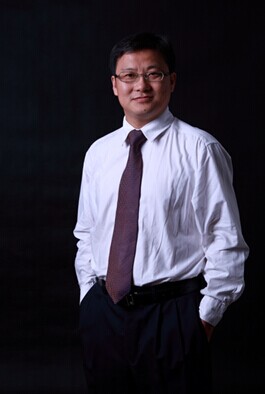
Lei Aiwen is a Professor and doctoral supervisor of the College of Chemistry and Molecular Sciences at Wuhan University. In 2014, he was awarded the People of the Year at Wuhan University and has won the Chinese Chemistry Society-Royal Society of Chemistry Young Chemist Award. Professor Lei’s main research fields are organic chemistry, organometallic chemistry and bioinorganic chemistry. Professor Lei obtained his doctoral degree at the Shanghai Institute of Organic Chemistry in 2000. From 2000 to 2003, he was a Postdoctoral Fellow at Pennsylvania State University. He stayed in Stanford University as a research associate before he returned to WHU in 2005.
No one can succeed without persistence
Professor Lei Aiwen is an extraordinarily excellent scholar both in China and aboard. People will definitely marvel at how many awards and honors he has received and how much he has contributed to the development of chemistry as a subject at WHU. His research group has published around 140 high-level research papers, among which 60 were published on top journals such as JACS and Angew in recent years.. So far, the group has made a lot of efforts in the field of oxidative coupling reaction by successfully developing three generations of it. Each generation is more economic and environmental than the former one. The third one is focusing on using two simple nucleophilies (R1-H/R2-H) to generate various compounds.
On the road of research, there is always more for us to explore and discover. Professor Lei shares his research group’s latest research results with us: “It consists of two parts. One is the fourth generation oxidative coupling reaction, which aims to use no oxidant in the reaction while producing the H2 during the process. We have already had some discoveries in this field. Another one is about the reaction mechanism. We have found crucial evidence to support or modify the existing mechanism. Fortunately, we have already modified the mechanism of one of the most famous Name Reactions, the Glaser-Hay reaction, by using some modern techniques like In-situ IR, XAFS, EPR, etc.”
Research is no easy task for everyone. Students may easily be racked with self-doubt and therefore hesitate to move forward. For students who get stuck in their research projects or who haven’t got any result from research, Professor Lei has his advice: “It is quite tough for those young people who had just start to do research. What I want to say is one needs persistence. No one could succeed without persistence on the road of research.”
I chose chemistry out of interest
All these years, Professor Lei Aiwen devotes himself to the research on development of oxidative coupling reactions and has made outstanding research achievements in this field. The motivation behind his achievements is simply his love for chemistry. It keeps him going and making new discoveries in this field. “I chose chemistry out of interest and love. Chemistry has its own charm and it has been appealing to me since junior high school. But now I find the mechanisms and the laws inside reactions to be the most fascinating part of chemistry.” Professor Lei said.
Professor Lei Aiwen spent five years in the United States before returning to China with new knowledge, new perspectives, and a deeper understanding of chemistry. He mentioned that despite the difficulties ahead of him when he came back to WHU, he got over it and established the green catalysis research group with his own perseverance and with support from the university. WHU,for him, is a place full of opportunities, where he is provided with good research facilities, where he meet his passionate and hardworking students. “I have to say that our students are the best ones I’ve met,” Professor Lei spoke highly of his students.
Professor Lei Aiwen enjoys a good relationship with his students and mentors them with great care and responsibility. He encourages his students by sharing his motto “Ambition, Passion, Hard Work” right at his lab, which is the core of this research group’s culture and spirit. He revealed a story to us: “when we were working at the Argonne National Laboratory in the USA, we got the perfect data at 4 a.m. after working for a long time without sleeping, so all of us went to enjoy the meat stewed by ourselves with happiness.” All that hard work pays off in the end.
The more we promote ourselves, the better results we get
With the backdrop of globalization, Professor Lei Aiwen has been actively engaged in exploring new international partners, which substantially promotes the internationalization of chemistry as a research and study subject at WHU’s .
To enhance the image of WHU and promote WHU’s chemistry subject worldwide, Professor Lei and his research group delivered 130 lectures in foreign countries to introduce their latest research findings and invited more than 60 scholars and professors in this field to visit and lecture at WHU.
We are in an era when internet changes the concept of distance while QQ and Wechat change our ways of communication. International cooperation is of great significance to the development of this subject. “It will change the traditional mode of their developments.” Professor Lei said, “Therefore, it is inevitable to make them international and multiple. The earlier we get involved, the better the position we will have on the international arena. The more we promote ourselves and our successes, the better results we will get. There are countless opportunities in terms of international cooperation and exchange.”
We still have a long way to go
WHU’s chemistry ranks top 1‰ worldwide when judged by the Essential Science Indicators (ESI), manifesting the high quality of study and research this subject has taken at WHU. Professor Lei Aiwen agrees that in China, chemistry is a subject that can be compared with the advanced world. But we still have a long way to go because it has potential to grow better and stronger. According to Professor Lei, Only if the university pays more attention and we make greater efforts, we will achieve a true breakthrough in this field in the future.
Professor Lei also has a clear plan for his research group. They will focus on developing oxidative coupling reaction in the fields of medicine, materials and industry in collaboration with many other departments. They also expect to make interesting discoveries in physical organic chemistry and in the basic research to illustrate the nature of the organic reaction by using the synchrotron radiation facility. For this, they will strengthen cooperation with their counterparts in other countries and regions. “We work with the Argonne National Laboratory in USA, the National Synchrotron Radiation Research Center in Taiwan, the Shanghai Synchrotron Radiation Facility and so on,” Professor Lei mentioned at the end of interview, with a confident look in his eyes.
(Edited by Sijia Hu & Diana)
For more information about Professor Lei Aiwen, please refer to:
http://en.whu.edu.cn/info/1073/1765.htm


